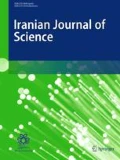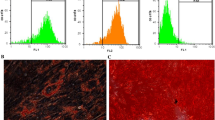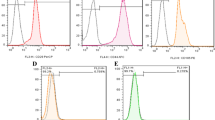Abstract
Heart failure (HF) is a leading cause of death that has remained incurable. Recently, stem cell therapy has emerged as a promising tool in cardiac regenerative medicine. Human amniotic membrane-derived mesenchymal stem cells (hAMSCs) with unique characteristics can be used in HF treatment. Here, we aimed to examine the effects of hAMSCs transplantation on cardiac fibrosis in a rat model of ISO-induced HF. Forty male Wistar rats were divided into four groups: sham, isoproterenol-induced HF ((Iso)-)ISO, ISO + culture medium, and ISO + hAMSCs. HF was induced by subcutaneous injection of isoproterenol 170 mg/kg/d in 4 consecutive days. Four weeks later, in ISO + hAMSCs, 3 × 106 hAMSCs were injected into the myocardium, whereas the ISO + culture medium was only injected by cell culture medium. Finally, cardiac functions and hemodynamic parameters were measured. Immunohistochemistry (IHC), Western blot, and histological assessment were performed to evaluate myocardial fibrosis and detect vascular endothelial growth factor (VEGF) collagen type I and III expression level. HF model caused a decrease in ejection fraction (EF) and fraction shortening, whereas both were increased after hAMSCs transplantation. IHC and Western blot and Western blot analyses confirmed that hAMSCs could attenuate fibrosis, reduce collagen I and III depositions, and increase VEGF expression. Intramyocardial transplantation of hAMSCs improves cardiac functions and myocardial structure caused by HF. A rise in VEGF expression presents hAMSCs as a compatible source of stem cell therapy for HF.







Similar content being viewed by others
Availability of Data and Material
The authors confirm that the data supporting the findings of this study are available within the article [and/or] its supplementary materials.
Code Availability
Not applicable.
References
Afousi AG, Gaeini A, Rakhshan K, Naderi N, Azar AD, Aboutaleb N (2019) ’Targeting necroptotic cell death pathway by high-intensity interval training (HIIT) decreases development of post-ischemic adverse remodelling after myocardial ischemia/reperfusion injury. J Cell Commun Signal 13:255–267
Bulati M, Miceli V, Gallo A, Amico G, Carcione C, Pampalone M, Conaldi PG (2020) The immunomodulatory properties of the human amnion-derived mesenchymal stromal/stem cells are induced by INF-γ produced by activated lymphomonocytes and are mediated by cell-to-cell contact and soluble factors. Front Immunol 11:54
Cai B, Tan X, Zhang Y, Li X, Wang X, Zhu J, Wang Y, Yang F, Wang B, Liu Y (2015) Mesenchymal stem cells and cardiomyocytes interplay to prevent myocardial hypertrophy. Stem Cells Trans Med 4:1425–1435
Failla CM, Carbo M, Morea V (2018) Positive and negative regulation of angiogenesis by soluble vascular endothelial growth factor receptor-1. Int J Mol Sci 19:1306
Ge Q, Zhang H, Hou J, Wan L, Cheng W, Wang X, Dong D, Chen C, Xia J, Guo J (2018) VEGF secreted by mesenchymal stem cells mediates the differentiation of endothelial progenitor cells into endothelial cells via paracrine mechanisms. Mol Med Reports 17:1667–1675
Gunawardena TN, Abeysinghe MT, Rahman BJ, Abdullah J, Kasim NHA (2019) Conditioned media derived from mesenchymal stem cell cultures: The next generation for regenerative medicine. J Tissue Eng Regen Med 13:569–586
Guo Y, Yunsheng Y, Shijun H, Chen Y, Shen Z (2020) The therapeutic potential of mesenchymal stem cells for cardiovascular diseases. Cell Death Disease 11:1–10
Jain M, Minocha E, Tripathy NK, Singh N, Chaturvedi CP, Nityanand S (2019) Comparison of the cardiomyogenic potency of human amniotic fluid and bone marrow mesenchymal stem cells. Int J Stem Cells 12:449
Jiao J, Tian W, Qiu P, Norton EL, Wang MM, Eugene Chen Y, Yang B (2018) Induced pluripotent stem cells with NOTCH1 gene mutation show impaired differentiation into smooth muscle and endothelial cells: implications for bicuspid aortic valve-related aortopathy. J Thorac Cardiovasc Surg 156:515–522
Joo HJ, Kim J-H, Hong SJ (2017) ’Adipose tissue-derived stem cells for myocardial regeneration. Korean Circul J 47:151
Karbasiafshar C, Sellke FW, Ruhul Abid M (2021) Mesenchymal stem cell-derived extracellular vesicles in the failing heart: past, present, and future. Physiol-Heart Circul Physiol 320:H1999–H2010
Kheila M, Gorjipour F, Gohari LH, Sharifi M, Abotaleb N (2021) ’Human mesenchymal stem cells derived from amniotic membrane attenuate isoproterenol (ISO)-induced myocardial injury by targeting apoptosis. Med J Islam Republ Iran’ 35:650–56
Li LL, Peng C, Zhang M, Liu Y, Li H, Huibo Chen Y, Sun CZ, Zhang Y (2018) Mesenchymal stem cells overexpressing adrenomedullin improve heart function through antifibrotic action in rats experiencing heart failure. Mol Med Reports 17:1437–44
Li L, Zhao Q, Kong W (2018) Extracellular matrix remodeling and cardiac fibrosis. Matrix Biol 68:490–506
Li L, Zhang S, Zhang Y, Bo Y, Yan X, Guan ZZ (2009) Paracrine action mediate the antifibrotic effect of transplanted mesenchymal stem cells in a rat model of global heart failure. Mol Biol Reports 36:725–731
Li S, Hao X, Xiao S, Xun L (2020) The effect of YiQiFuMai on ischemic heart failure by improve myocardial microcirculation and increase eNOS and VEGF expression. Int J Clin Med 11:84
Maleki SN, Aboutaleb N, Nazarinia D, Beik SA, Qolamian A, Nobakht M (2019) Conditioned medium obtained from human amniotic membrane-derived mesenchymal stem cell attenuates heart failure injury in rats. Iran J Basic Med Sci 22:1253
Martins IJ (2016) Anti-aging genes improve appetite regulation and reverse cell senescence and apoptosis in global populations. Adv Aging Res 5(1):9–26. https://doi.org/10.4236/aar.2016.51002
Martins IJ (2017) Single gene inactivation with implications to diabetes and multiple organ dysfunction syndrome. J Clin Epigenet 3:100058
Martins IJ (2017) ’Nutrition therapy regulates caffeine metabolism with relevance to NAFLD and induction of type 3 diabetes. J Diabetes Metab Disord 4:1–9
Mary G, Van de Walle A, Perez JE, Ukai T, Maekawa T, Luciani N, Wilhelm C (2020) High-throughput differentiation of embryonic stem cells into cardiomyocytes with a microfabricated magnetic pattern and cyclic stimulation. Adv Funct Mater 30:2002541
Mead B, Tomarev S (2017) Bone marrow-derived mesenchymal stem cells-derived exosomes promote survival of retinal ganglion cells through miRNA-dependent mechanisms. Stem Cells Trans Med 6:1273–1285
Nagaya N, Kangawa K, Itoh T, Iwase T, Murakami S, Miyahara Y, Fujii T, Uematsu M, Ohgushi H, Yamagishi M (2005) ’Transplantation of mesenchymal stem cells improves cardiac function in a rat model of dilated cardiomyopathy. Circulation 112:1128–1135
Nakata TM, Suzuki K, Uemura A, Shimada K, Tanaka R (2019) Contrasting effects of inhibition of phosphodiesterase 3 and 5 on cardiac function and interstitial fibrosis in rats with isoproterenol-induced cardiac dysfunction. J Cardiovasc Pharmacol 73:195–205
Narita T, Suzuki K (2015) Bone marrow-derived mesenchymal stem cells for the treatment of heart failure. Heart Fail Rev 20:53–68
Naseroleslami M et al (2021) Lavender oil attenuates myocardial ischemia/reperfusion injury through inhibition of autophagy and stimulation of angiogenesis. Iran J Sci Technol Trans A: Sci 45(4):1201–1209
Pang L-X, Cai W-W, Li Q, Li H-J, Fei M, Yuan Y-S, Sheng B, Zhang K, An R-C, Ying-Wei O (2021) Bone marrow-derived mesenchymal stem cells attenuate myocardial ischemia–reperfusion injury via upregulation of splenic regulatory T cells. BMC Cardiovasc Disord 21:1–12
Park J, Lee JH, Yoon BS, Jun EK, Lee G, Kim IY, You S (2018) ’Additive effect of bFGF and selenium on expansion and paracrine action of human amniotic fluid-derived mesenchymal stem cells. Stem Cell Res Therapy 9:1–17
Rasti A, Mehrazma M, Madjd Z, Abolhasani M, Zanjani LS, Asgari M (2018) ’Co-expression of cancer stem cell markers OCT4 and NANOG predicts poor prognosis in renal cell carcinomas. Sci Reports 8:1–11
Seo H-H, Lee Se-Y, Lee CY, Kim R, Kim P, Sekyung O, Lee H, Lee MY, Kim J, Kim LK (2017) Exogenous miRNA-146a enhances the therapeutic efficacy of human mesenchymal stem cells by increasing vascular endothelial growth factor secretion in the ischemia/reperfusion-injured heart. J Vasc Res 54:100–108
Sharifi M, Nazarinia D, Ramezani F, Azizi Y, Naderi N, Aboutaleb N (2021) Necroptosis and RhoA/ROCK pathways: molecular targets of Nesfatin-1 in cardioprotection against myocardial ischemia/reperfusion injury in a rat model. Mol Biol Reports 48:2507–2518
Shi M, Zhao F, Sun L, Tang F, Gao W, Xie W, Cao X, Zhuang J, Chen X (2021) Bioactive glass activates VEGF paracrine signaling of cardiomyocytes to promote cardiac angiogenesis. Mater Sci Eng C 124:112077
Sid-Otmane C, Perrault LP, Ly HQ (2020) Mesenchymal stem cell mediates cardiac repair through autocrine, paracrine and endocrine axes. J Trans Med 18:1–9
Simic P, Zainabadi K, Bell E, Sykes DB, Saez B, Lotinun S, Baron R, Scadden D, Schipani E, Guarente L (2013) SIRT1 regulates differentiation of mesenchymal stem cells by deacetylating β-catenin. EMBO Mol Med 5:430–440
Simko F, Bednarova KR, Krajcirovicova K, Hrenak J, Celec P, Kamodyova N, Gajdosechova L, Zorad S, Adamcova M (2014) Melatonin reduces cardiac remodeling and improves survival in rats with isoproterenol-induced heart failure. J Pineal Res 57:177–184
Tousi SM, Razavi T, Faghihi M, Nobakht M, Molazem M, Kalantari E, Azar AD, Aboutaleb N (2016) Improvement of heart failure by human amniotic mesenchymal stromal cell transplantation in rats. J Tehran Univ Heart Center 11:123
Tsuji-Tamura K, Ogawa M (2018) Morphology regulation in vascular endothelial cells. Inflam Regen 38(1):1–13
Watanabe M, Horie H, Kurata Y, Inoue Y, Notsu T, Wakimizu T, Adachi M, Yamamoto K, Morikawa K, Kuwabara M (2021) Esm1 and Stc1 as angiogenic factors responsible for protective actions of adipose-derived stem cell sheets on chronic heart failure after rat myocardial infarction. Circul J 85:657–666
Yang J, Zhou W, Zheng W, Ma Y, Lin L, Tang T, Liu J, Jiefeng Yu, Zhou X, Jianguo H (2007) Effects of myocardial transplantation of marrow mesenchymal stem cells transfected with vascular endothelial growth factor for the improvement of heart function and angiogenesis after myocardial infarction. Cardiology 107:17–29
Yun CW, Lee SH (2019) Enhancement of functionality and therapeutic efficacy of cell-based therapy using mesenchymal stem cells for cardiovascular disease. Int J Mol Sci 20:982
Zainabadi K (2018) The variable role of SIRT1 in the maintenance and differentiation of mesenchymal stem cells. Regen Med 13:343–356
Zhang H, He S, Spee C, Ishikawa K, Hinton DR (2015) SIRT1 mediated inhibition of VEGF/VEGFR2 signaling by Resveratrol and its relevance to choroidal neovascularization. Cytokine 76:549–552
Zhang X-J, Tan H, Shi Z-F, Li N, Jia Y, Hao Z (2019) Growth differentiation factor 11 is involved in isoproterenol-induced heart failure. Mol Med Reports 19:4109–4118
Acknowledgements
Present work was funded by a research grant from Physiology Research Center of Iran University of Medical Sciences.
Funding
The authors did not receive support from any organization for the submitted work.
Author information
Authors and Affiliations
Contributions
NA was involved in conceptualization and study design; SMTRT and MN contributed to investigation and data collection; YA was involved in writing the original draft; NA, SMTRT, YA and MN contributed to writing—review and editing.
Corresponding author
Ethics declarations
Conflict of interest
The authors declare that they have no conflict of interest.
Ethical Approval
The animal use, experimental procedures, and care protocols were approved by School of Medicine Animal Care and Use Committee of Iran University of Medical Sciences. All protocols and animal operation rules were confirmed by the Animal Ethical Committee of Iran University of Medical Sciences.
Consent to Participation
The amniotic membranes were provided from Shahid Akbar Abadi Hospital upon informed consent of the participants in accordance with the ethical standards of the institutional and/or national research committee and with the 1964 Helsinki declaration and its later amendments or comparable ethical standards.
Consent for Publication
Not applicable.
Rights and permissions
About this article
Cite this article
Razavi Tousi, S.M.T., Sharifi, M., Naseroleslami, M. et al. Mesenchymal Stem Cells Derived from Human Amniotic Membrane Increase VEGF and Extenuate Fibrosis in Heart Failure Rats. Iran J Sci Technol Trans Sci 46, 781–791 (2022). https://doi.org/10.1007/s40995-022-01307-4
Received:
Accepted:
Published:
Issue Date:
DOI: https://doi.org/10.1007/s40995-022-01307-4




